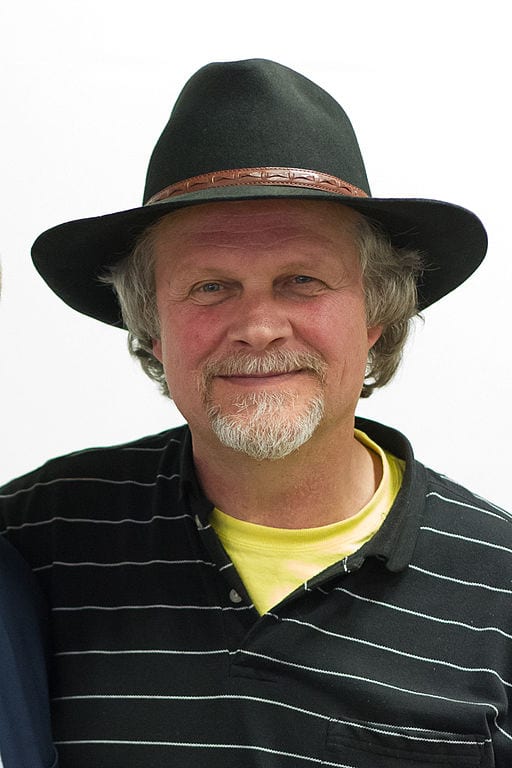
I first ran across former Christian minister and atheist John W. Loftus back in 2006. We dialogued about the problem of evil, and whether God was in time. During that period I also replied to an online version of his deconversion: which (like my arguments about God and time) he didn’t care for at all. I’ve critiqued many atheist deconversion stories, and maintain a very extensive web page about atheism. In 2007 I critiqued his “Outsider Test of Faith” series: to which he gave no response. Loftus’ biggest objection to my critique of his descent into atheism was that I responded to what he called a “brief testimony.” He wrote in December 2006 (his words in blue henceforth):
Deconversion stories are piecemeal. They cannot give a full explanation for why someone left the faith. They only give hints at why they left the faith. It requires writing a whole book about why someone left the faith to understand why they did, and few people do that. I did. If you truly want to critique my deconversion story then critique my book. . . . I challenge you to really critique the one deconversion story that has been published in a book. . . . Do you accept my challenge?
I declined at that time, mainly (but not solely) for the following stated reason:
If you send me your book in an e-file for free, I’d be more than happy to critique it. I won’t buy it, and I refuse to type long portions of it when it is possible to cut-and-paste. That is an important factor since my methodology is Socratic and point-by-point. . . . You railed against that, saying that it was a “handout.” I responded that you could have any of my (14 completed) books in e-book form for free.
Throughout August 2019, I critiqued Dr. David Madison, a prominent contributor to Loftus’ website, Debunking Christianity, no less than 35 times. As of this writing, they remain completely unanswered. I was simply providing (as a courtesy) links to my critiques underneath each article of Dr. Madison’s, till Loftus decided I couldn’t do that (after having claimed that I “hate” atheists and indeed, everyone I disagree with). I replied at length regarding his censorship on his website. Loftus’ explanation for the complete non-reply to my 35 critiques was this: “We know we can respond. It’s just that we don’t have the time to do so. Plus, it’s pretty clear our time would be better spent doing something else than wrestling in the mud with you.” He also claimed that Dr. Madison was “planning to write something about one or more of these links in the near future.” Meanwhile, I discovered that Dr. Madison wrote glowingly about Loftus on 1-23-17:
When the history of Christianity’s demise is written (it will fade eventually away, as do all religions), your name will feature prominently as one who helped bring the world to its senses. Your legacy is secure and is much appreciated.
This was underneath an article where Loftus claimed: “I’ve kicked this dead rodent of the Christian faith into a lifeless blob so many times there is nothing left of it.” I hadn’t realized that Loftus had single-handedly managed to accomplish the stupendous feat of vanquishing the Hideous Beast of Christianity (something the Roman Empire, Muslims, Communists, and many others all miserably failed to do). Loftus waxed humbly and modestly ten days later: “I cannot resist the supposition that my books are among the best. . . . Every one of my books is unique, doing what few other atheist books have done, if any of them.”
These last three cited statements put me “over the edge” and I decided to buy a used copy of his book, Why I Became an Atheist (revised version, 2012, 536 pages) and critique it, as he wanted me to do in 2006. Moreover, on 8-27-07 he made a blanket challenge about the original version of this book: “I challenge someone to try this with my book. I might learn a few things, and that’s always a goal of mine. Pick it up and deal with as many arguments in it that you can. Deal with them all if you can.” His wish is granted (I think he will at length regret it), and this will be my primary project (as a professional apologist) in the coming weeks and probably months.
Despite all his confident bluster, I fully expect him to ignore my critiques. It’s what he’s always done with me (along with endless personal insults). I’m well used to empty (direct) challenges from atheists, based on my experience with Madison and “Bible Basher” Bob Seidensticker, who also has ignored 35 of my critiques (that he requested I do). If Loftus (for a change) decides to actually defend his views, I’m here; always have been. And I won’t flee for the hills, like atheists habitually do, when faced with substantive criticism.
The words of John Loftus will be in blue.
*****
John Loftus’ chapter 3 is entitled, “The Outsider Test for Faith” (pp. 64-78).
Loftus summarizes this argument of his as follows:
(1) Rational people in distinct geographical locations around the globe overwhelmingly adopt and defend a wide diversity of religious faiths due to their upbringing and shared cultural heritage.
(2) [T]o an overwhelming degree, one’s religious faith is causally dependent upon cultural conditions.
From (1) and (2) it follows that:
(3) It is highly likely that any given adopted religious faith is false.
Given these odds we need a test, or an objective standard, to help us determine if our inherited religious faith is true, so I propose that:
4) The best and probably the only way to test one’s adopted religious faith is from the perspective of an outsider with the same level of skepticism one uses to evaluate other religious faiths.
. . . I’m not arguing that religious faiths are completely culturally relative and therefore all false because of religious diversity. I’m merely arguing that believers should be very skeptical of their faith because of these cultural factors. . . . (p. 65)
If you were born in Saudi Arabia you would be a Sunni Muslim right now. . . . If you were born in the first century BCE in Israel, you’d adhere to the Jewish faith, and if you were born in Europe in 1200 CE, you’d be a Roman Catholic.. . . In short, we are overwhelmingly products of our times. (p. 66)
At the very minimum, believers should be willing to subject their faith to rigorous scrutiny by reading many of the best-recognized critiques of it. For instance, Christians should be willing to read this book of mine and others I’ve published. (p. 68)
[T]hey can no longer start out by believing that the Bible is true . . . nor can they trust their own anecdotal religious experiences, since such experiences are had by people of all religious faiths who differ about the cognitive content learned as the result of these experiences. (pp. 68-69)
If after you have investigated your religious faith with the presumption of skepticism, you find that it passes intellectual muster, you can have your religious faith. It’s that simple. If not, abandon it. (p. 71)
I answered an earlier version of Loftus’ argument in September 2007. The following draws heavily from that article of mine.
I fully agree with the “rational self-examination” core of this argument. It’s a major reason why I do apologetics. Religious views need to be held with a great deal more rationality and self-conscious analysis of the epistemological basis and various types of evidences for one’s own belief.
I believe everyone should study to know why they believe what they believe. On the other hand, I deny that there is no religious knowledge or evidence other than these hard proofs from scientific inquiry. There are also highly complex internal or instinctive or subjective or experiential factors that have been analyzed at great length by philosophers like William Alston (see Alvin Plantinga (“properly basic belief”). Those are huge discussions, but not to be dismissed as irrelevant to the present line of inquiry.
Many (and probably most) Christians never do the recommended self-examination of their faith and its basis; I agree. Again, this is among the many reasons why I have devoted myself to apologetics. I would say, though, that there is a version of this “become whatever your surroundings dictate” argument that can be turned around as a critique of atheism.
Many atheists — though usually not born in that worldview — nevertheless have decided to immerse themselves in atheist / skeptical literature and surround themselves with others of like mind. And so they become confirmed in their beliefs. We are what we eat. In other words, one can voluntarily decide to shut off other modes and ways of thinking in order to become “convinced” of a particular viewpoint. That is almost the same mentality as adopting a religion simply because “everyone else” in a culture does so, or because of an accident of birth. People can create an “accident of one-way reading” too.
My position, in contrast, is for people to read competent advocates of any given debate and see them interact with each other. That’s why I do so many dialogues. John Loftus wrote these papers and books, and they might seem to be wonderfully plausible, until someone like me comes around to point out the fallacies in them and to challenge some of the alleged facts. Inquirers need to read both sides and exercise their critical faculties (not just Christians or only atheists). The most fruitful, helpful debates are those where both sides know their stuff and have the confidence to defend themselves and the courage and honesty to change their opinions if they have been shown that truth and fact demand it.
It’s true that most people believe in the religious view that they were born into. But of course, some (many?) change their minds later on. And we must also take into account variations within religions. In my case, for example, one could say “sure, you’re a Christian because most Americans claim to be so.” True enough on one level, but it is false insofar as it would presuppose that I am a Christian only because of this factor and no others.
In fact, I have made up my mind as an individual and often changed my opinions. I was born into a liberal Methodist family. I never resonated with that much, and stopped going to the Methodist church when I was ten. I then became a “secularist” or “practical atheist” for about eight years. That went against my background because both parents and all four grandparents were Methodists. I then converted to evangelical Christianity at age 18. There wasn’t much of that in my larger (mostly Canadian) family, either. And at length I converted to Catholicism at age 32. There were virtually no Catholics in my extended family. So I was making decisions on my own regardless of what folks around me believed (particularly in my Catholic conversion). Therefore, this whole analysis doesn’t really apply to me, if we examine it closely and take it a step deeper and out of the broadest generalities.
I’m not saying that my type of path is anywhere near the norm, but I am saying that there are (who knows how many?) folks like me to which this “test” doesn’t apply. We didn’t adopt our religious views simply because of what the majority of people around us believed, or because it was what we were raised in. We thought it through and came to our own conclusions.
Another relevant factor to consider is that many beliefs in other religions are similar or identical to Christian ones. This would cause this argument to have to be qualified, since the “diversity” is not as great as it may seem at first glance. All religions and indeed ethical systems (whether religious or not) have great commonalities. This was a central thesis of C. S. Lewis’s book The Abolition of Man. Anyone can word-search the free online version for “Appendix Illustrations of the Tao” to find many examples of commonalities in ethics. For example, Lewis found the Golden Rule in the Analects of Confucius: “Never do to others what you would not like them to do to you.”
We need not reject all other religions in toto; just aspects of them that we believe to be untrue. For example, we have no objection to Jews following the 613 commandments of Mosaic Law or keeping kosher. Buddhists are often pro-life, and teach about personal asceticism: something not unlike Catholic monasticism. Muslims still have lots of children (like American Christians used to), and are against abortion and premarital sex and pornography. All great stuff . . .
Lewis’ argument, and one often made by Christian apologists, is that such commonality is an an indication of the truthfulness of those tenets which are widely held in common. If virtually every religious (or conscientious atheist) person in the world believes in some form of the Golden Rule, then that is evidence that the Golden Rule is likely true. If diversity suggests much falsehood (as I agree it does), then commonality suggests much truth in play.
I agree that every Christian should have a reasonable faith, that can withstand rational and skeptical examination. I do this myself and I write so that others can share in the same confidence and blessing that I receive as I do apologetics and interact with other people of different beliefs. I have also long accepted the sociological basis of much actual belief, on account of my reading of social analysts such as Thomas Kuhn (The Structure of Scientific Revolutions) and Michael Polanyi.
Every person is responsible for his or her own intellectual advancement. The trouble is that public education is so rotten today that young minds aren’t formulated in ways that would further this end. They are spoon-fed secularist propaganda bleached of any Christian influence whatsoever, and then given a massive sophisticated dose of anti-Christianity in college (so that many students lose their faith because they are so overwhelmed and unprepared), as if this were a fair, intelligent way of going about things. They are what they eat too.
That’s why secularists are so intent on removing any vestige of Christianity from education, because they prevail only by people being ignorant of any alternative. I was a thoroughly secularist pro-choice, pro-feminist, political and sexual liberal coming out of high school. I would have repeated the party line impeccably (in marvelously blissful ignorance). But when I started reading some materials with a different perspective during my college years and shortly afterwards (Christian, politically conservative, pro-life), my opinions changed because I had a rational basis to compare one view with another, rather than merely aping propagandistic slogans learned by rote repetition (which is much of liberal, secularist education these days).
But (back to Loftus’ argument) there are no absolutely clean slates. This is where I would disagree, based on the analyses of people like Plantinga, Alston, and Polanyi (the latter almost single-handedly dismantled logical positivism). We can be sure that the alleged “neutral skeptic” has a complete set of predispositions, biases, and even some prejudices: as we all do to one degree or another.
I do, however, believe in being as objective and fair as we possibly can be, even given our inevitable biases and belief-system that cannot be erased merely by playing the game of philosophy and supposed extreme, dispassionate detachment.
There are a number of evidential or empirical tests that Christianity and other religions can be subjected to. The argument from biblical prophecy offers a chance to test by real, concrete historical events whether the predictions were accurate or not. A study of Jesus’ Resurrection, that involved a dead body and a rock tomb guarded by Roman soldiers, provides hard facts that have to be dealt with and explained somehow. The cosmological and teleological theistic arguments offer hard scientific facts and details that are rationally explained as suggesting a God. All miraculous claims can be examined with a fine-toothed comb.
At least for the western religions, there are several tests from various fields of study (natural science, archaeology, textual analysis, historiography, philosophical arguments, etc.) that can be brought to bear. Those from these traditions (Christianity, Judaism, Islam) hold lots of beliefs along those lines in common, and so can compare the relative strength of their religious claims. Eastern religion is another story, and the presuppositions and conception of God is so different that it is difficult to test or examine rationally by these same standards.
In the Catholic tradition, there are many eyewitness accounts of people being raised from the dead (St. Augustine, for example, attested to this). There are all sorts of miracles. For example: the incorrupt bodies of saints. If you can take a dead person out of their grave twenty, fifty years or more after their death, and the body has not decayed, and it is because they were a saintly person, then that is hard empirical evidence that confirms Christian, Catholic teaching. You have the mystery of the stigmata, that could be seen in, e.g., St. Padre Pio, who died in 1968. There is archaeological evidence confirming the claims of the Bible. Etc., etc. I have compiled some evidence for scientifically verified miracles at the Marian shrine in Lourdes, France.
Skeptics thumb their noses at all of this but it is not nearly so simple. There are unexplained phenomena here that have to be accounted for. We have our interpretation, but the atheist puts his head in the sand and claims that it’s all impossible because of their prior axiomatic beliefs that all miracles simply cannot happen because they allegedly “go against science ” (itself a blatant fallacy).
As for believing that the Bible is true: we test it like any other source of history: through historiographical scholarship and archaeology. The Bible has been verified again and again in this fashion and has proven itself highly accurate, insofar as it correctly reports historical, geographical, biographical details, etc.
Wholly apart from religious faith, then, we can establish that it is a remarkably accurate document that can be trusted to accurately report things. That’s the bare minimum. Once supernatural events are being discussed, the argument must be made on an entirely different plane: legal-historical evidences, philosophy, etc. But the Bible is not untrustworthy on the basis of inaccuracy of things that can be empirically verified.
Loftus has never replied to any of these arguments of mine for almost twelve years (except with personal insults towards me). He claims that Christians have offered no good replies to this argument. I believe that I have offered some (that’s for readers to determine).
Bottom line: everyone is in this same boat (as Loftus agrees). We all have to / should / must examine why we believe what we believe. The Outsider Test is almost an apologia for Christian apologetics: when applied to Christianity. In a large sense, he almost makes my case for me. His arguments apply to those who are ignorant of apologetics and rational defense of their views. Loftus even rather dramatically concedes: “If after you have investigated your religious faith with the presumption of skepticism, you find that it passes intellectual muster, you can have your religious faith” (p. 71). I couldn’t agree more!
It’s undeniably true (believe me, I know, in my profession) that most people, whether religious or atheist, don’t think very much about their worldview, and why they believe in God or disbelieve in His existence. Oftentimes, they don’t even know what they believe. This will be the case all the more as western culture continues to become more and more postmodernist, relativist, nominal as to religion and metaphysics and “ultimate questions of meaning,” and subjective. Religion and atheism both are often regarded as merely subjective and “personal” matters: for which (it is falsely claimed) no objective criteria of truth or falsity are relevant or even possible.
Moreover, the same dynamic that Loftus critiques as to Christians is seen in nations that are becoming predominantly atheist / non-religious. Folks who are born into those environments will (statistically, as the trends continue) be far more likely to grow up as good card-carrying atheists (simply due to happenstance and where they were born), who think far more like Loftus does than like I do. Hence, we might observe, as a prime example, what is happening in England. An article in The Guardian (11-14-18) about falling Church of England attendance, noted:
Figures published by the British Social Attitudes survey in September showed that affiliation with the C of E was at a record low, at 14% – and down to 2% among young adults. More than half the population said they had no religion.
So millions who happen to be born in England are far more likely than those born in America, to be nominal about religion or atheist. And the vast majority of these won’t be able to defend their positions against examination, just as most Christians also cannot. They couldn’t care less about discussing it at all. Even atheists who are supposedly able to do so (polemicists or “apologists” for their “cause”), rarely interact with serious Christian critiques. Why?
The entire argument can be thrown back onto Loftus and atheists. Why are they so unwilling (like most Christians) to subject their views to scrutiny? Why do they confine their online discourse almost solely to cheerleading “groupthink” echo chambers: their own comboxes, where they can safely “preach to the choir” and quickly gang up on anyone who enters and dares to dissent form the party line? Why did Bob Seidensticker, who runs the popular Cross Examined blog, completely ignore 35 direct critiques I have made of his arguments (after he challenged me to write them)? Is this being intellectually deficient and/or dishonest, as Loftus charges Christians who act the same way? Does this extraordinary, determined reluctance suggest a lack of confidence in his own views?
Why has Dr. David Madison, who blogs on Loftus’ own Debunking Christianity site, also utterly ignored 35 of my critiques against his atheist articles, that aggressively attack Christian beliefs? The same questions apply to him, just as Loftus applies them to Christians who can’t rationally explain why they believe what they believe. Goose and gander. Meanwhile, I’m here doing exactly what Loftus calls for (and what I have done since 1981, as an apologist): subjecting my views to scrutiny and examination through multiple hundreds of dialogues, and extending the same courtesy to atheists (who almost universally refuse to respond to such inquiries). In other words, they act exactly as most Christians do in this regard.
And if John Loftus also chooses to ignore these critiques of his book (that he challenged me to do way back in 2006, and boldly challenges anyone and everyone to do), he will help to prove my point, too. We have to look at what both Christians and atheists do; not just what they say, and claim to believe, just as Jesus rebuked His proclaimed followers who were being hypocritical:
Luke 6:46 “Why do you call me ‘Lord, Lord,’ and not do what I tell you?”
Christians have no monopoly on either ignorance or hypocrisy. Loftus talks a good game. He writes well and articulately presents his case. Now let’s see if he can back up his own rhetoric with defenses of his views, as they are seriously examined (just as he examines and rejects ours).
***
Photo credit: John Loftus at SASHAcon 2016 at the University of Missouri; Mark Schierbecker (3-19-16) [Wikimedia Commons / Creative Commons Attribution-Share Alike 4.0 International license]
***













